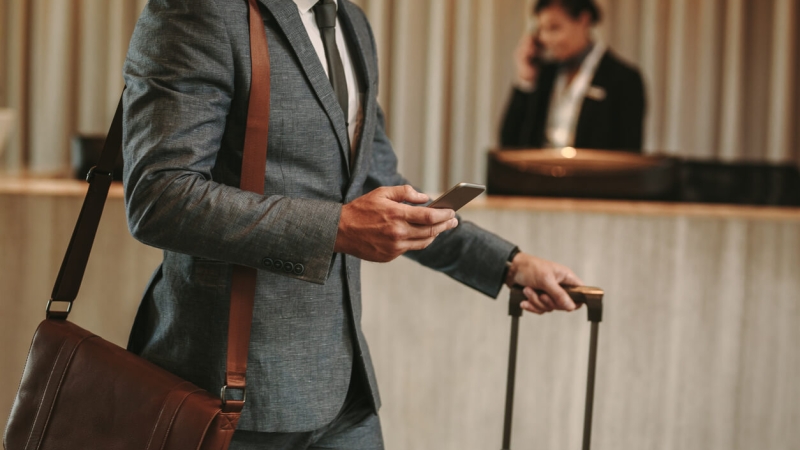The COVID-19 pandemic brought the need for many businesses to create and offer contactless services in order to stay afloat. In response, many hotels worked hard to implement no-contact options, such as hotel mobile check-in, in an effort to keep both guests and employees safe. It's one of the many pieces of technology revolutionizing the hospitality industry, and it may be here to stay.
What is mobile check-in, exactly? How many hotels are adopting the service? Are hoteliers planning to keep using hotel mobile check-in technology post-pandemic? In this post, we’re going to answer all of those questions, and much more.
The complete guide to hotel mobile check-in
What is hotel mobile check-in and how does it work?
Mobile check-in is a self-service hotel technology that allows hotel guests to complete the check-in process on their mobile devices. Typically through an app, hotel guests are able to use hotel mobile check-in to select their room and complete the check-in process prior to their arrival at the hotel. Guests are able to skip any line at the front desk and check right into their room upon a contactless arrival, using their mobile device as the key to their room.
Maximize your business with the right hotel technology
What hotels are using mobile check-in, and why?
In large part due to the pandemic and the era of hotel digital transformation, mobile check-in became a priority for hotel employees and guests alike, and the technology is likely to remain a post-pandemic hospitality trend. Now that the genie is out of the bottle, and guests have become accustomed to self-service technology, mobile check-in may not be a nice-to-have option for long.
Oracle published A Data-Driven Look at Hospitality’s Recovery in 2020 to analyze the effects COVID had on the hospitality industry, the evolution of services, and changes in guest preferences. According to the study, “71% of consumers are more likely to stay in a hotel offering self-service tech.” In addition, the report concludes that 73% of hoteliers believe that self-service guest technology will continue to become an increasingly important part of their business.
Many large hospitality brands have invested heavily in hotel mobile check-in technology. Hilton, Hyatt, IHG, Wyndam, and Marriott all have digital check-in services that allow hotel guests to skip the front desk and check-in right from their mobile device.
What are the benefits of hotel mobile check-in?
While mobile check-in services became an elemental part of hotel operations during the pandemic, the everyday benefits of e-check-in services are substantial. Digital check-in procedures can add value for guests and hoteliers alike.
Guest benefits
It’s no wonder that travelers of all ages are seeking out mobile check-in services when booking a hotel. Typically, guests who choose digital check-in can:
- Skip the line. With digital check-in, guests can go straight to their ready room upon arrival.
- Choose a room prior to arrival. Afraid of heights? Prefer to be close to or away from the elevator? Interested in a room near a smoking exit? Choose the best location to fit your stay needs and select your room number.
- Check-in early. As soon as your room shows up on the app as “ready,” you can check in.
- Receive notifications when your room is ready. Never wait around in the lobby again. With push notifications, you’ll know the moment your room is entered into the hotel system as clean and ready for the next guest.
- Update details quickly. Hotel mobile check-in apps provide easy-to-read reservation details that allow guests to make updates to their stay quickly. View rewards information, point details, and often local information such as weather or traffic reporting.
Hotel benefits
Hotel mobile check-in is just one digital transformation tool that hotels can use to help find success in an increasingly digital world.
- Promote your app. By adding app-accessible mobile check-in services, hoteliers are able to drive guests to download their app. Hotel revenue managers are able to engage with guests via the app, cultivate a relationship prior to the guest’s arrival, and attempt to upsell guests with additional amenities or services to boost hotel sales prior to check-in.
- Catch expired payment methods. Most mobile check-in systems will notify the front desk if an e-check-in has a missing or expired payment. Staff can flag the reservation to ensure that the guest has to come physically check-in to update their method of payment before gaining access to the room.
- Helpful for the front desk. Adding hotel mobile check-in to your services can streamline the check-in process, reduce friction at the front desk, and allow guest service associates to spend more time with individual guests. Increased interaction with guests can lead to improved guest satisfaction, higher guest engagement, the opportunity to create a more personalized guest experience, and overall score increases.
- Hotels can get guest information ahead of time. See guest requests and booking information, and be notified of a missing payment before the guest’s arrival.
- Stay competitive with area hotels. As hotels are implementing contactless check-in procedures, more guests will likely come to expect the service, especially from well-known brands. Hotels struggling to win their fair share of business against the comp set should ensure that they’re keeping up with technology trends in the area.
- Increased digital marketing opportunities. Appeal to your target market with a tech-friendly ad campaign that illustrates how your hotel is on the cusp of new tech trends. Create a new and personalized digital marketing campaign to reach guests via email, hotel or brand app, and through popular social media platforms.
Is there a downside to mobile check-in?
While the benefits of hotel mobile check-in are abundant, implementing the technology may come with a few drawbacks.
Downside for guests
Not every traveler is a fan of mobile hotel check-in. There are a few aspects of digital check-in that some guests may find unappealing.
- Low phone batteries. Mobile key users with a low phone battery, or who often leave their phone behind, may want to get a physical key copy from the front desk as backup. If you leave your phone in the room, or the battery dies, you will have to get a key from the front desk. As most hotels require a photo ID to get a room key copy, this could lead to unnecessary back-and-forth trips to the room.
- Internet issues. A bad internet connection in the hallways could lead to difficulty opening your guest room door via smartphone. While hotels that have implemented digital key services should also have invested in ample wireless coverage, the internet can be fickle. If service goes down in the area, or the mobile app becomes inaccessible, guests will likely need to get a hard-copy key to access their room.
- Less person-to-person interaction. Guests who choose hotel mobile check-in could miss out on a more personalized guest experience by minimizing their contact with hotel employees.
Downside for hotels
While hotels can benefit greatly from adding mobile check-in services for guests, there are a few cons to consider. Some hoteliers may have experienced difficulty working with digital check-in services as the result of a lack of updated employee training, budget constraints, or out-of-our-control disasters, such as a blackout.
- Implementation will require updated front desk policies. Hoteliers who add digital check-in options without comprehensive front desk training could see mobile check-in guests booking available rooms out from under guests in line. It’s important, especially during high-demand times, that hotels create a process for ensuring that mobile check-in rooms are assigned before physical check-in starts.
- New software. Adding hotel mobile check-in services will likely require the implementation of new software systems, equipment, or both. Installation can be a lengthy, messy, and expensive undertaking that can require rooms to be taken out of order, potentially harming a hotel’s profit margins for a brief period.
- A power or internet outage can cause major disruptions. In the event of a blackout, hotel mobile check-in guests will likely need to have manual keycards made to access their rooms. If the manual key system requires internet access or electricity to function, however, this could cause chaos for an overwhelmed front desk staff, especially at a large property.
Should my property hop on the hotel mobile check-in bandwagon?
New advances in digital and mobile hotel technology are being implemented in the hospitality industry each year. It’s quickly becoming a big part of what guests want from a hotel. Hotels looking to stay shoulder to shoulder with competitors will need to keep up with digital advances.
Are your competitors offering mobile check-in? If you're failing to keep up with the new technology being offered by comparable hotels in the area, you could be missing an opportunity to appeal to tech-savvy travelers, pushing potential business to the competition. Adding services and amenities to match hotel technology trends can help hoteliers drive growth.
Small properties, such as inns, bed and breakfasts, or roadside motels, may not have enough guest rooms to necessitate additional check-in assistance. Properties that offer a limited number of guest rooms may find the cost of digital key installation and maintenance to be too cumbersome. While certainly beneficial during the need for contactless travel, small hotels may not find the long-term benefits substantial enough to justify the initial costs.
Remember, hotel mobile check-in is meant to improve the lobby experience for guests, not replace it. While “contactless” service options may not become the future standard in overall operations, the convenience and value offered to guests has become an expectation for many travelers. Adding or improving digital check-in options can help streamline hotels, which will benefit both hoteliers and guests long after the pandemic has subsided.
Frequently asked questions about hotel mobile check-in
How do I use mobile hotel check-in?
To check into your hotel via mobile check-in, or digital check-in, use your phone as the room key. Select the room you’d like prior to arrival, and complete the check-in process through an app or link sent to you from the hotel. Once checked in, your phone itself will be the key to your room.
Do you need an app for mobile hotel check-in?
Most hotels that offer e-check-in options do so via app. Hilton Honors members, for example, will complete the check-in process through the Hilton Honors app, where the room key loads directly to your phone. Other hotels, especially those not part of a larger chain or worldwide brand, may send a link via text or email that guests can click to complete the online check-in process.
Why should I use mobile check-in?
Use hotel mobile check-in to skip the front desk line and check-in to your room right from your phone. Digital check-in options allow hotel guests to automate much of the check-in process, which can speed it up and lead to a more efficient arrival process, which can ultimately lead to a better overall experience for hotel guests.
Is it safe to use hotel mobile check-in?
While some travelers may express concerns that their private or sensitive data may be at risk using hotel mobile check-in, the technology that hotels have adopted to allow digital check-in is incredibly advanced. Not only does it reduce the possibility of human error, most mobile check-in apps require photo identification and a verification process.







